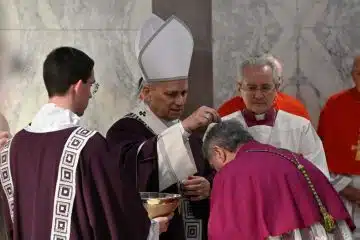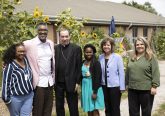Members of rural life conferences meet with Archbishop Schnurr
Wednesday, December 15, 2010
By David Eck
DAYTON DEANERY — The fate of Grand Lake St. Marys and the ongoing debate over livestock care standards were among the issues farmers in the Cincinnati archdiocese discussed with Archbishop Dennis M. Schnurr Dec. 9 during a joint meeting of the St. Mary’s/Sidney and St. Martin Catholic Rural Life Conferences.
 |
| Archbishop Dennis M. Schnurr makes a point during a joint meeting of the St. Marys/Sidney and St. Martin Rural Life Conferences. Looking on is Tony Wenning. |
Missionary of the Precious Blood Brother Nicholas Renner explained that toxic algae in the lake, which some say has been partially caused by fertilizer and manure run-off from local farms, has resulted in the loss of more than $2 million in recreation on the lake. At nearly 13,000 acres, Grand Lake St. Marys is Ohio’s largest inland lake, but it is now largely unused because of the algae.
Tension over the lake’s condition peaked this summer, Brother Nicholas said, but efforts are shifting from cause to addressing the problem.
“We’ll take some of the blame for it,” Brother Nicholas said. “There are other players involved in it.”
Conference representatives reported on various issues and initiated an open discussion with Archbishop Schnurr. The special joint meeting of the conferences was held at the Pilarczyk Center in Dayton.
Discussion at the meeting centered on public perception that farmers mistreat their animals, when in reality they are protecting themselves and their livestock when they use methods that may appear questionable.
Jeff Wuebker, a farmer from Versailles and a member of the Ohio Livestock Care Standards Board, said the board has worked on an agreement with the United States Humane Society over care standards. The board continues its work on creating additional standards and penalties.
“Raising an animal in a farm situation is much different than raising a pet in your house,” said Vern Seger, chairperson of the St. Marys/Sidney Rural Life Conference and a farmer in Minster. “There’s a lot of misunderstanding, and we’ve got to get that straightened out. There’s going to be a lot of give and take.”
Archbishop Schnurr, who grew up in rural Iowa and has family members who farm, said farmers respect livestock and the land and would not do anything to jeopardize their livelihood.
“Farmers don’t abuse animals,” he said. “That is not the norm.”
Pat Hornschemeier, chairperson of the St. Martin conference, said that group is working on preservation of farmland and an effort to encourage more people to buy local food products.
Rural plunges, during which young people from an urban area spend several days on a farm learning about farm life, are sponsored by both conferences. The plunges help young urban people understand where their food comes from and the work it takes to produce it.
“Too many people are just so concerned with their own lives they’ve forgotten what’s going on in the world of agriculture,” Seger said. “We’ve made it too easy for them to get food.”
Georgetown farmer Patty Schwartz explained that the plunges connect young people with farms and give them insights they would never pick up in a classroom. Schwartz and her husband, Jim, operate a small farm and sell their produce and meat at local markets.
Linking urban residents with farmers also helps them understand the challenges farmers face, she said, noting that today’s young people are several generations removed from farm life and can’t relate to it.
“I think there’s a real need to get in touch with people in other parishes to let them know the rural life conference exists,” Jim Schwartz said. “They need to know the issues.”
Other topics discussed included the 2012 farm bill, the financial cost of beginning a farm career and concerns over inheritance taxes that make it difficult for farms to be passed from one generation to the next.
Archbishop Schnurr shared stories of his own rural upbringing and recalled tasseling corn. The archbishop said he still enjoys gardening. He said that once a person experiences rural life, it’s difficult for them to leave it.
“It’s a way of life but, there’s also a rhythm to that way of life,” Archbishop Schnurr said. “I experienced it. I grew up with it.”
David Eck can be reached at [email protected].













